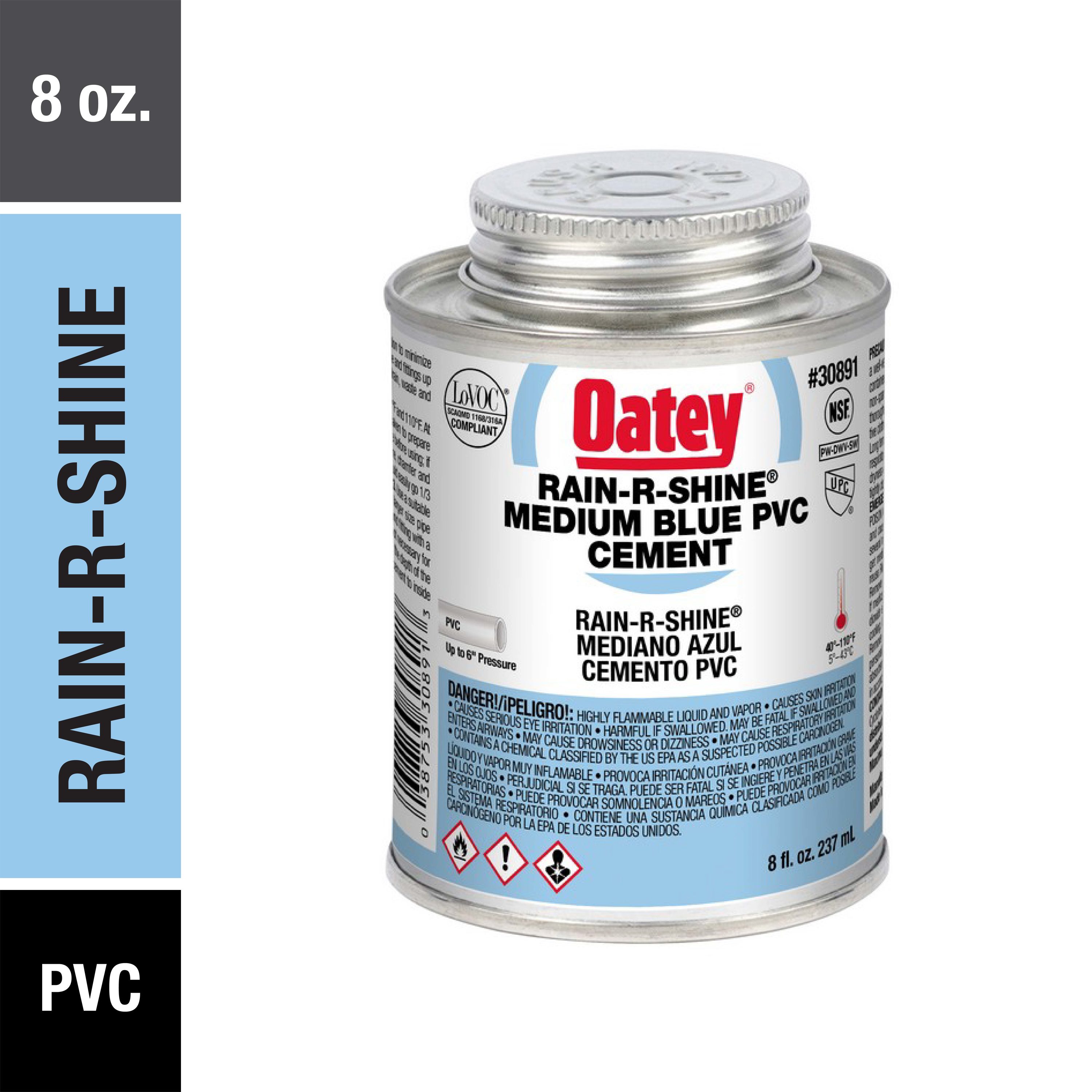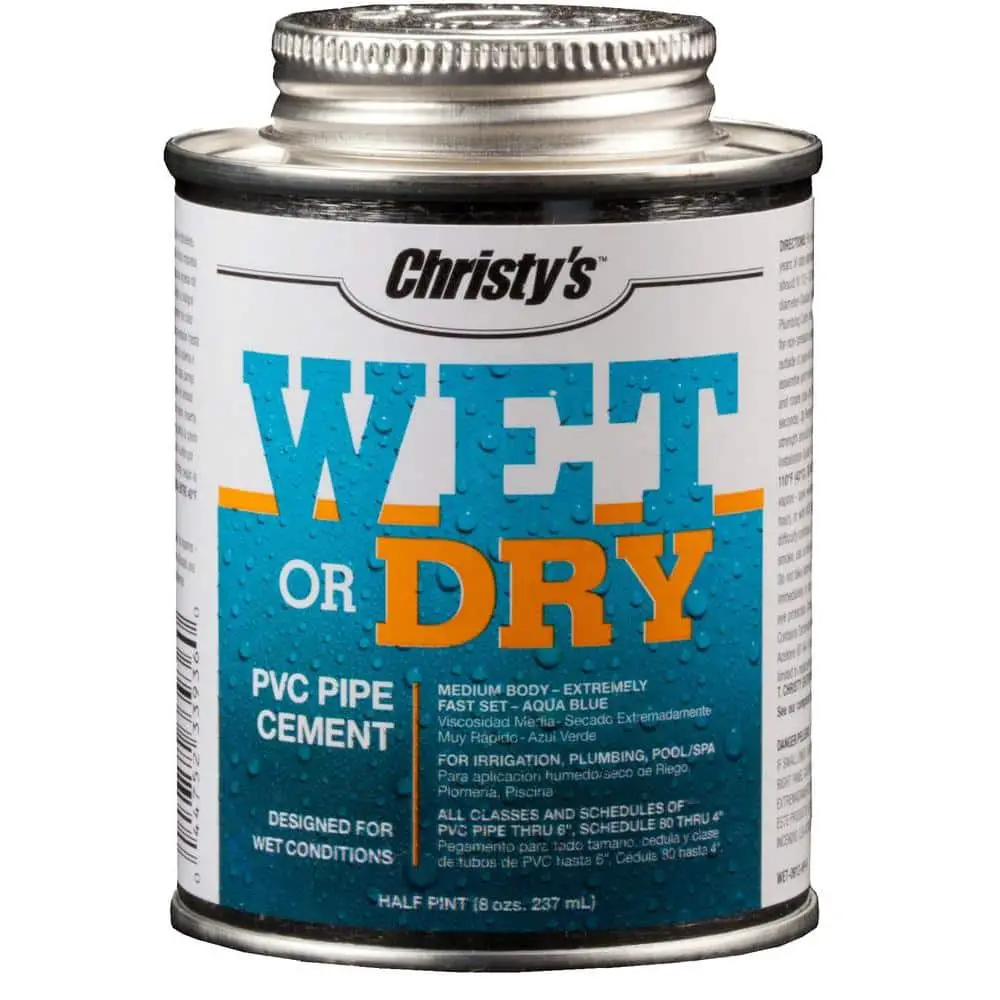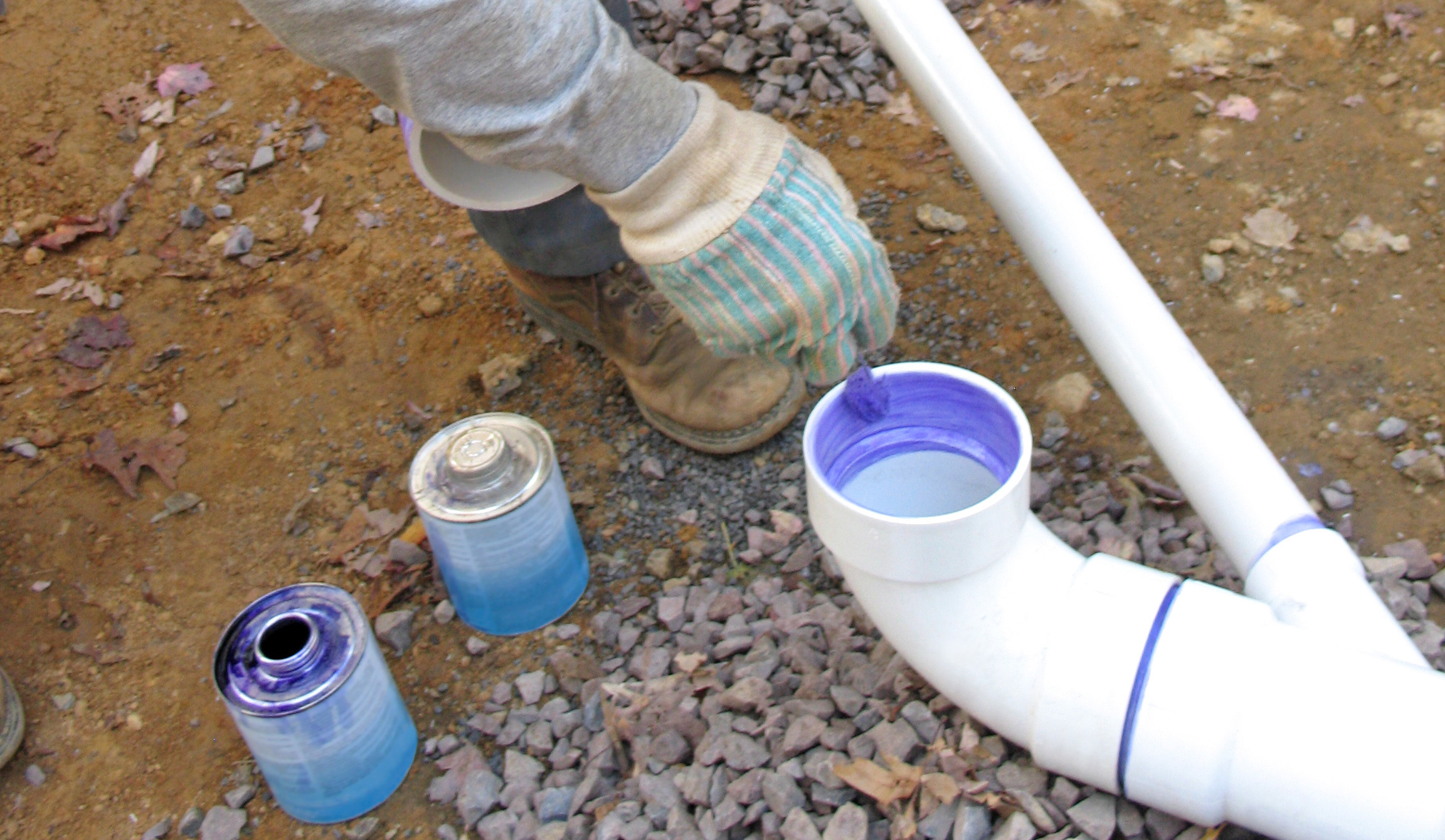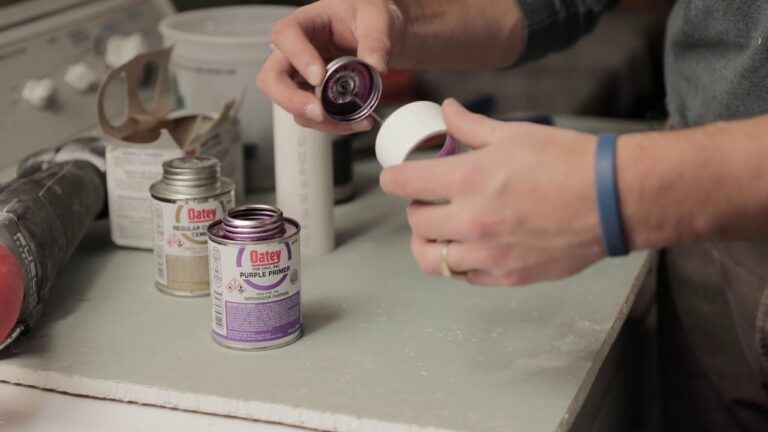PVC pipe is a great material for projects like this because it is strong and durable. Plus, it is easy to work with and glue together. Here is a quick guide on how to glue PVC pipe.
- Start by cleaning the pipe. Use a clean rag or brush to remove any dirt, dust, or debris.
- Next, apply a thin layer of PVC glue to the inside of the fitting.
- Quickly insert the pipe into the fitting and twist it a few times to spread the glue evenly.
- Hold the pipe in place for a few minutes while the glue dries.
- Once the glue is dry, your PVC pipe should be securely glued together.
What is the best pvc glue

PVC cement is available in different formulations, including those that are suitable for use with potable water.
What is the difference between PVC glue and PVC cement?
PVC glue and PVC cement are both adhesives used to fix PVC pipes. PVC glue is a water-based adhesive that is applied to the outside of the pipe, while PVC cement is a solvent-based adhesive that is applied to the inside of the pipe. PVC cement is stronger than PVC glue, but both adhesives are suitable for most repairs.
What glue do plumbers use?
Plumbers use a special glue to join PVC pipes together. The glue creates a strong bond between the pipes and prevents them from leaking. It is important to use the right glue to ensure that the pipes are properly sealed.
What is the best adhesive for PVC?
If you’re looking for the best adhesive for PVC, you need to consider what you’ll be using it for. For example, if you’re looking for an adhesive that will be used in a wet environment, you’ll need to find one that is waterproof. There are many adhesives on the market that claim to be the best, but it’s important to find one that is specifically designed for PVC. Once you’ve found the right adhesive, make sure to follow the instructions carefully so that you get the best results.
What is the best glue ever?
PVC pipe can be glued together with a variety of different adhesives. The best glue for PVC pipe is a PVC cement. PVC cement is a type of adhesive that is specifically designed for use with PVC pipe. It is a strong adhesive that creates a watertight seal.
What type of glue is best?
There are many different types of glue that can be used to assemble PVC pipes, but not all of them are equally effective. Some glues work better than others, and it is important to choose the right type of glue to ensure a strong and durable connection. Some of the most popular types of glue for PVC pipes include PVC cement, epoxy, and polyurethane glue. Each of these glues has its own advantages and disadvantages, so it is important to choose the right one for your particular project. PVC cement is one of the most popular options for bonding PVC pipes.
It is easy to use and provides a strong and permanent bond. However, it can be difficult to remove if you need to make repairs in the future. Epoxy is another popular option for gluing PVC pipes. It is stronger than PVC cement, but it can be more difficult to use. It is also not as forgiving if you make a mistake, so it is important to be careful when using epoxy. Polyurethane glue is a newer option that is becoming increasingly popular for gluing PVC pipes. It is stronger than epoxy and is also more flexible, which can be beneficial if you need to make repairs in the future. It is also more expensive than other options.
How do you clean up PVC glue?
In order to clean up PVC glue, you will need to use a solvent. A solvent will dissolve the glue and make it easy to remove. You can find solvents at your local hardware store. Once you have a solvent, simply apply it to the glue and wait for it to dissolve. Then, you can wipe it away with a rag or a sponge.
What glue works on pvc pipe

If you’re wondering what glue works on PVC pipe, the answer is PVC cement. This special glue is designed specifically for use with PVC pipe and fittings. It creates a strong, permanent bond that will hold up under pressure. To use PVC cement, simply apply it to the outside of the pipe and the inside of the fitting. Then, push the two pieces together and hold them in place for a few seconds.
The bond will set quickly, so you’ll need to work quickly to get the pieces positioned the way you want them. PVC cement is a great option for creating a leak-proof, permanent bond on PVC pipe. It’s easy to use and provides a strong, durable connection.
Can u use Gorilla Glue on PVC pipe?
No, you cannot use Gorilla Glue on PVC pipe. PVC pipe is made of a different material than Gorilla Glue is designed to adhere to, so it will not hold up. In addition, Gorilla Glue is not designed for use in plumbing applications.
What kind of glue do plumbers use?
There are many types of plumbing glue, but the most common one used for PVC pipe is called PVC cement. This cement is a strong adhesive that creates a permanent bond between two pieces of PVC pipe. It is important to note that not all glues are created equal, and some may not be suitable for use with PVC pipe. Always check the label to make sure the glue you select is compatible with the type of pipe you are using.
Can you use plastic glue on PVC?
If you’re wondering whether you can use plastic glue on PVC, the answer is yes! This type of glue is specifically designed for use with PVC, so it will create a strong bond that will hold up over time. Just be sure to follow the instructions on the packaging carefully, as the process can vary depending on the brand.
Can you use superglue on PVC pipe?
Yes, you can use superglue on PVC pipe. PVC pipe is made of a type of plastic called polyvinyl chloride. Superglue is a type of adhesive that can be used on many different materials, including plastic. When using superglue on PVC pipe, it’s important to make sure that the surfaces you’re bonding are clean and free of any dirt or grease. Otherwise, the glue may not adhere properly. Also, be sure to apply the glue evenly to avoid creating a weak spot in the bond.
Is there a substitute for PVC glue?
There is no substitute for PVC glue that will provide the same level of bonding and waterproofing. When bonding PVC pipes together, it is important to use a generous amount of glue in order to create a strong and lasting joint.
Can you glue a broken PVC pipe back together?
No, you cannot glue a broken PVC pipe back together. PVC pipes are made of polyvinyl chloride, which is a plastic. When PVC pipes break, the plastic becomes brittle and can no longer be glued together.
Do you need to Prime PVC before gluing?
Before gluing PVC pipe, it is important to prime the pipe. This will ensure that the glue will adhere properly and create a strong bond. Without priming, the glue may not adhere correctly and the pipe could leak.
How long should you let PVC glue set before turning on water?
Before turning the water on, you should wait at least 24 hours for the PVC glue to set. This will allow the glue to fully adhere to the pipe, creating a stronger bond. If you turn the water on too soon, the pressure could cause the glue to fail and leak.
How long before you can run water through PVC after gluing?
After gluing PVC pipe, you need to wait at least 24 hours before running water through it. This allows the glue to set properly and create a strong seal. If you try to use the pipe before the glue is fully set, you could damage the pipe or cause a leak.
How do you remove glue from PVC pipe?
To remove glue from PVC pipe, you will need to use a solvent. Acetone or MEK are both good choices. You will also need a putty knife or similar tool.
- First, score the glued area with the putty knife to break the seal.
- Next, apply the solvent to a clean cloth and wipe away the glue.
- You may need to repeat this process a few times to remove all of the glue.
- Finally, rinse the area with water and dry it off.
How do you join PVC pipes together?
In order to join PVC pipes together, you will need to use a special type of glue that is specifically designed for PVC. This type of glue can be found at most hardware stores. To use the glue, simply apply it to the inside of the PVC pipe that you wish to join, and then push the two pipes together. The glue will set in a few minutes and the join will be secure.
How to unglue PVC pipe?
In order to unglue PVC pipe, you will need to use a special solvent that is designed to dissolve the glue that is holding the pipe together. You can find this solvent at most hardware stores. Apply the solvent to the area where the glue is holding the pipe together and wait for it to dissolve. Once the glue has dissolved, you should be able to pull the pipe apart.
How to use pvc pipe glue

This type of glue is typically used to join two pieces of PVC pipe together. In order to use PVC pipe glue, you will need to follow these steps:
- Clean the surface of the PVC pipes that you want to glue together. This step is important because it will help the glue to adhere to the pipes more easily.
- Apply the glue to the surface of one of the PVC pipes.
- Join the two PVC pipes together.
- Hold the pipes together for a few minutes until the glue has had a chance to set.
- Allow the glued pipes to dry for 24 hours before using them.
How long should PVC glue dry before turning on water?
PVC glue typically takes 24 hours to fully cure, so it is best to wait at least that long before turning on the water.
Will PVC glue work if pipe is wet?
Will PVC glue work if the pipe is wet? It is possible that the glue will still work if the pipe is wet, but it is not recommended. The best way to ensure a good bond is to clean the pipe with alcohol or acetone before applying the glue.
Does heat make PVC glue dry faster?
When the glue is applied to the surface of the pipe, it starts to harden and dry, which makes the pipe stronger and more durable. Some people believe that applying heat to the PVC glue will make it dry faster, but this is not true. PVC glue dries at the same rate regardless of whether it is exposed to heat or not. However, heat can help to speed up the bonding process between the two pieces of pipe.
Do I need to Prime PVC pipe before gluing?
No, you don’t need to prime PVC pipe before gluing. The glue will adhere to the PVC pipe without priming.
Can you stop a leak with PVC glue?
Yes, you can use PVC glue to stop a leak in a PVC pipe.
- First, clean the area around the leak with a cloth.
- Then, apply the PVC glue to the leaky area.
- Wait for the glue to dry, and then check the leak to see if it has been stopped.
Do you have to sand PVC pipe before you glue it?
Before gluing PVC pipe, you must first sand the pipe to create a smooth surface. This will help the glue to adhere to the pipe and create a stronger bond. Without sanding the pipe, the glue may not adhere properly and the joint may be weaker.
Can you use too much PVC glue?
You can use too much PVC glue when connecting PVC pipes, and this can cause problems. Too much glue can make the pipes difficult to disconnect, and it can also make the joint weaker. It is important to use the right amount of glue, and to follow the manufacturer’s instructions.
Why is my PVC glue not holding?
There are a few reasons why your PVC glue might not be holding. One possibility is that you didn’t clean the surfaces of the pipe and fitting before you applied the glue. PVC glue requires a very clean surface in order to adhere properly. Another possibility is that you didn’t apply enough glue. Be sure to apply a generous amount of glue to both the pipe and fitting, and spread it around evenly. You should also make sure that you didn’t apply the glue too close to the edge of the pipe or fitting, as this can also prevent the glue from holding. If you’re still having trouble, try a different brand of PVC glue.
How soon can you use PVC pipe after gluing?
PVC pipe can be used immediately after gluing, as long as the glue is dry. PVC glue dries quickly, so you won’t have to wait long before using the pipe. Just make sure that the pipe is dry before using it.
Can you take PVC pipe apart after glued?
You can take PVC pipe apart after glued, but it may not be as easy as you think. The glue that is used to hold the pipe together is designed to be strong, so you may need to use a little force to get the pipe apart. If you are not careful, you may end up damaging the pipe.
